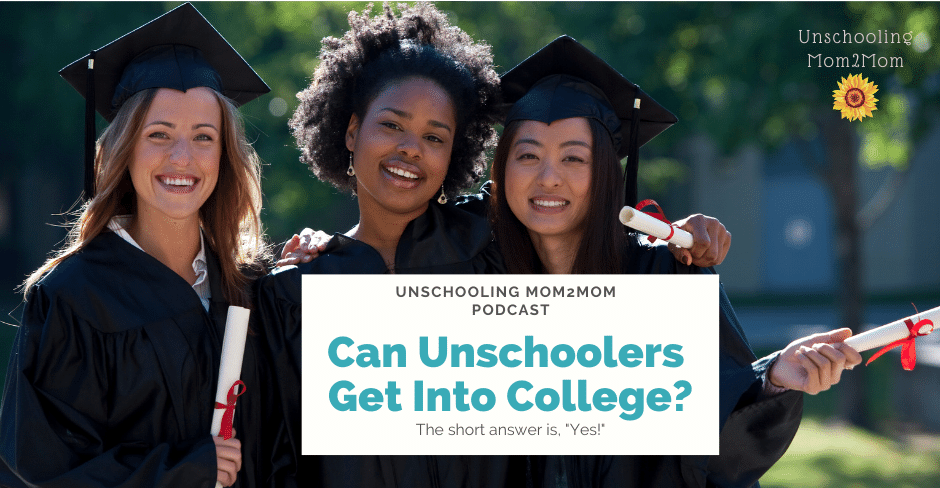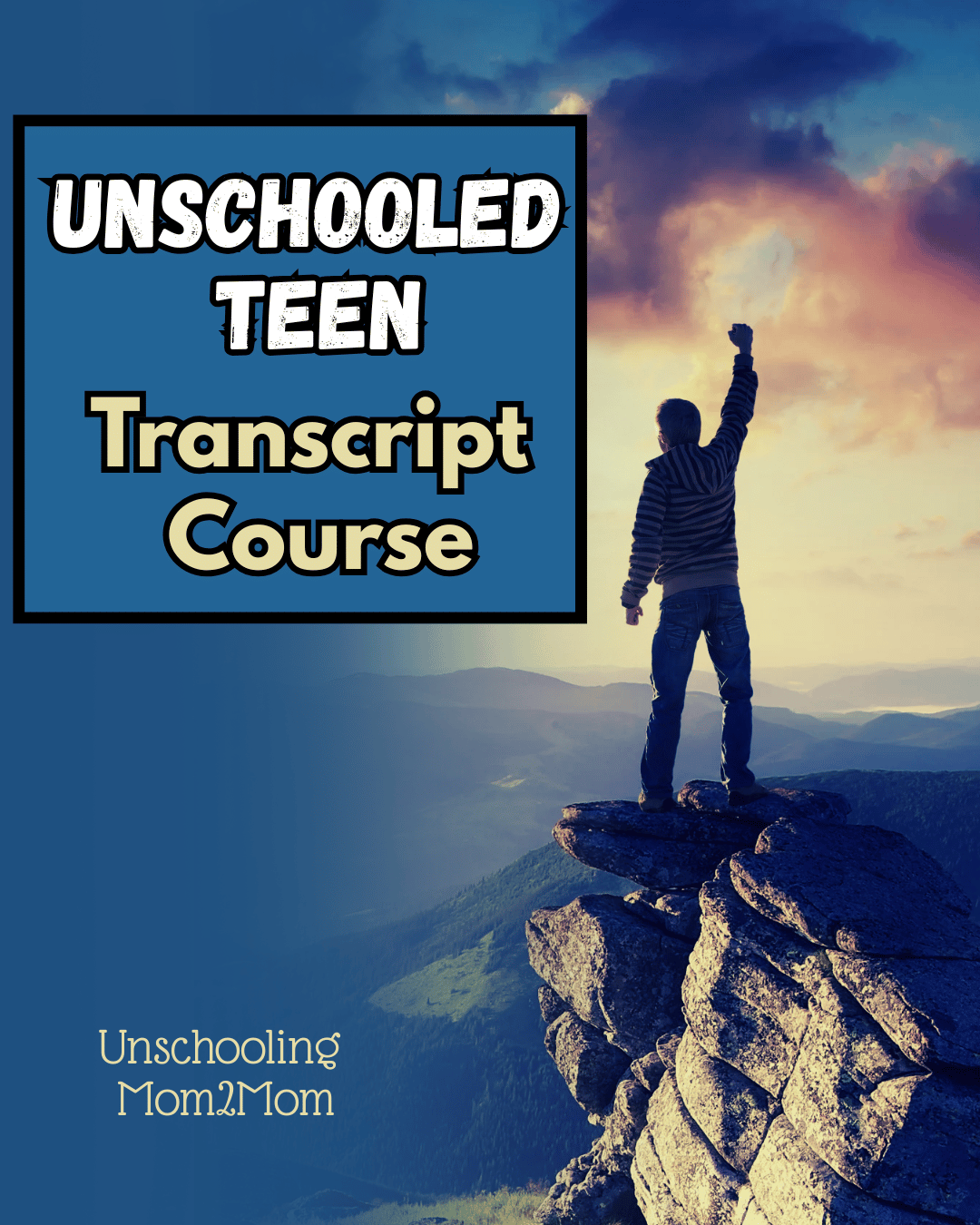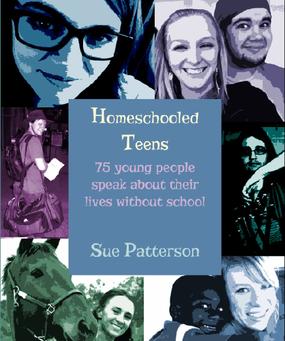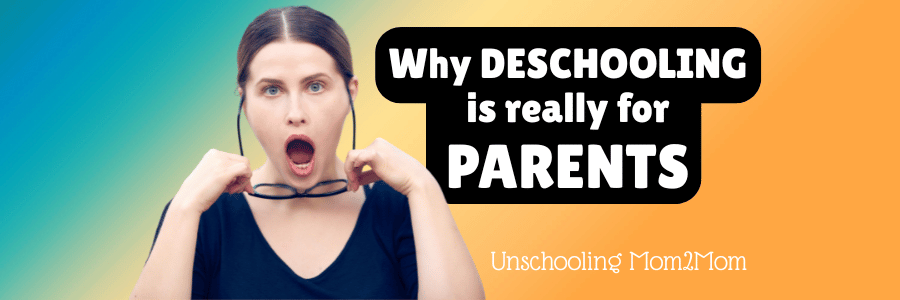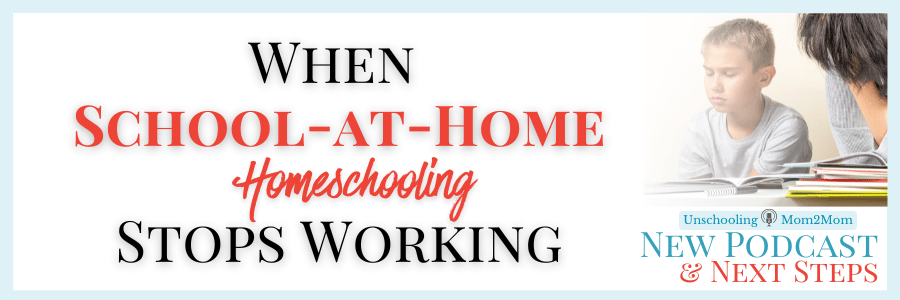Unschoolers to College – Is That Possible?
Can Unschoolers Get Into College?
Podcast Transcript:
We’ve talked before about unschooling teens from a more general perspective, but I want to talk a little about the concern parents have for
getting their unschoolers to college.
Or more specifically, NOT being able to get into college because they didn’t jump through the traditional hoops.
And if you’re new around here, I want to squash that thought right away.
Unschooled teens get into college all the time.
But back to teens and college.
All this being said, college isn’t the goal for many kids. Heck, it’s not even the goal for many of the kids who DO go! They were just on the school conveyor belt, and More School seems to be what high schools want to prepare kids for. Unschooled kids have hopped off the conveyor belt and are able to ascertain if they want college or not. It’s a conscious choice. Sometimes it’s because they want a particular career path, and it’s needed. Sometimes they choose college because they want to explore something in more depth. Sometimes they use it to get people off their back about learning - nothing like being able to respond to a typical question with, “IDK, I’m in college classes now!”
When we talk about college, there are a couple of paths… one involves the community college and the other involves going to a university. And I guess a third path - one that is taken by many unschoolers - starting at a community college and transferring to a university.
One of the most common questions people ask is...
What about Transcripts?
How do you translate an unschooled life into something acceptable for a college admission?
First, breathe. It’s doable. It’s not even super difficult.
If you look at daily activities they’ve participated in, you can see how subjects weave throughout the week.
For Example...
Building a bike ramp has elements of Physics, P.E., Anatomy/Physiology, Weather, Research, Technology, Math all throughout! So your job as the unschooling parent, is to make a list of their hobbies, activities, and interests throughout their teens. You can put those in one column. And then next to it, you can have a column to identify the traditional subjects that are present in the activity. This helps to give you ideas of what to count on their transcript. It’s going be similar to a patchwork quilt - a little of this, and a little of that, and when add it all up, that’s English 101.
I have a blogpost you can look at that I’ll link below. Or go to the Unschooling Mom2Mom.com website and put “Transcripts” in the search box.
Feeling Nervous about This?
If this seems overwhelming and a little scary, I have a course you can grab with a video recordings and walk-throughs to help you! I've included workbook pages and tools to help you translate everything into a transcript that will get your teens into colleges or careers.
And if you’re thinking, “Uh-oh, I didn’t record anything!” You did take a bunch of pictures - they’re probably still in your phone. And you can look back at calendars to remind yourselves of various events and activities that happened. You can even sit and brainstorm with them reminiscing about what they did, year by year.
Some people create narrative transcripts, while others do more traditional transcripts. That’s what we opted for and you can see a couple of samples in the blogpost and in the workbook.
So once you have the transcript, what next?
The next Worry Hurdle for parents is they fear that their kids won’t be prepared for the entrance exams or the rigorous work. They’ve allowed a lot of other voices (usually from their past but always rooted in fear) to grab their attention. But, remember, if your kids see a reason to go to college, they'll conquer whatever obstacle is in their way. They can do it - have a little faith in them!
Unschooling & Transcripts
Do you need to figure this out ASAP? I can walk you through.
Or maybe you're a Planner, and you'd like to see how these next few years could look. Sometimes fear can get the better of us, so seeing these resources is like turning the light on in a dark room. It's not nearly as scary once you do that!
This course includes:
- Video Walk-through for BUILDING a transcript
- PDFs and Worksheets to help you
- Everything Counts Ebook
3 paths to a college degree:
#1 Getting into Community College
In the United States, our community college system is pretty easy to access. Some states are easier than others. But overall, there’s an entrance exam that teens sign up for. They can usually access a practice test, just to be familiar with the expectations. The thing to remember about these: you’re not trying to get an A on the test. You’re trying to show the college where you are in your (usually) math, reading, and writing skills. Even if the skills aren’t what’s expected of a high school graduate, the community college will put your teen in a class that will cover the skills they need! And interestingly, those classes (whether you consider them developmental, remedial, or just Math 0037) are filled with students who DID attend high school and still need refresher courses based on their entrance exam scores. As my daughter said,
“I had 12 years of doing what I wanted with my life for 3 semesters at college. Now I’m all caught up with all them. I’d say I had the better deal!”
#2 Going to a University
If your teen wants to go straight to a university, they’ll have to pass whatever requirements that university has set up. Maybe interviews, maybe essays, probably ACT or SAT scores. Doors aren’t closed for unschoolers here because they can take courses on passing the SAT or ACT or crack the Review Book and learn the material. The internet offers a variety of options to help with this. But one thing I want to mention - especially if your child is a younger teen - a lot of maturity happens between 13 and 17. Even more if you’re comparing a 19 year old. If you cannot imagine the angst you’d witness to get them to open the SAT Review book, then it’s not time yet. If and when they decide they want to go, that will be the motivation to push through and gain whatever skills they need to succeed. You nagging them about studying is a red flag. Wait for maturity to do it’s magical thing. Engage with them in other more present-day focused interests.
Another thought about why unschoolers do well when they choose this route, they’ve been fully engaged in life. They have interesting stories to share or experiences to write about in essays that show them to be bright and interesting and the kind of applicant universities are looking for! They don’t really want cookie-cutter future freshman… that a large number actually wash-out and reflect badly on the university. They want students that they can see will be successful. Confident unschoolers often step right up for this.
Lastly - and the most common approach:
#3 Transferring from Community College to a University
Way more unschooled teens opt for this route instead of going directly to the university though. A few reasons exist for this:
- Community college courses are less expensive than university level classes. So you may be fine with saving a little money on those freshman year classes, and leave the big bucks for the classes in the area of the major at the university .
- Having a community college “track record” looks good to universities that are used to looking for transcripts. Grades scored in a community college class don’t carry the same skepticism that an A from Mom carries on a homeschool transcript. (One reason I don’t recommend giving grades, unless you have to)
- Students who take their first year at the local community college can ease into the idea of showing up for class, doing the assignments - and still come home to mom fixing dinner or their home life with supportive adults that can still offer suggestions to help them navigate.
- After you’ve completed your first year in community college, you can transfer courses over to the university and enter as a sophomore without an SAT or ACT. Lots of colleges are moving away from these standardized tests anyway, but going as a Transfer Student allows you to skip those tests. Then you can prove yourself within the university classes, and as my son said, “It’s kind of easy. They tell you want to read, talk about it in class, test you on Friday. It’s not really tricky or hard to do.”
- The only thing to watch out for is taking the correct class to be transferable to the university your teen wants to ultimately attend. Certain classes are transferable while others aren’t - there’s usually a table or list of courses that are accepted online.
So those are the three ways unschoolers usually go to get into college. If you think they have to start “buckling down” earlier in their teens so they’ll be ready, that’s simply not true. Remember that 18 is not a magic number - they can start whenever it fits with what they want to do. They might even start by taking a photography course or some other hobby of interest, just to help them see that they’re ready for this next step. But creating some Academic Prep Plan is really not necessary at all. Remember, maturity is a real thing! It won’t hurt to wait for it! And you have these teen years to do fun cool things with them, creating shared experiences and connections that keep the relationship strong.
Leave a comment or send me an email if you have specific topics about Unschooling Teens that you’d like me to cover. Remember that I have a book Homeschooled Teens, where I talked to 75 Young People about their lives without school. So many families have found that reassuring. It’s at amazon and I’ll put it in the shownotes.
So that’s it from me this week. Enjoy your kids - don’t worry about the teen years - and I’ll be back with you next week!
Wish You Could Ask Your Questions?
So did I! I wanted to hear from as many young people as possible to see what their lives were REALLY like when they opted out of going to school.
This is exactly the reassurance you're looking for!
First-hand quotes as they answer the most frequently asked questions like:
- How did they learn?
- How did they make friends?
- How did they get into college?
- What was college like for them?
- What are they doing now?
... and 20 other questions you've been curious about as well!

